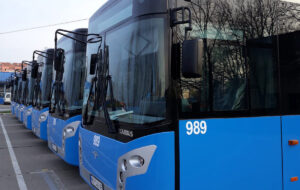 The EBRD (The European Bank for Reconstruction and Development) is financing improvements to public transport in Novi Sad, Serbia with the first project under the EBRD Green Cities program in an effort to tackle environmental challenges in the city.
The EBRD (The European Bank for Reconstruction and Development) is financing improvements to public transport in Novi Sad, Serbia with the first project under the EBRD Green Cities program in an effort to tackle environmental challenges in the city.
A €7 million loan agreement, which was signed by the EBRD and the Public Transport Company of Novi Sad, will allow the company to purchase new buses that run on compressed natural gas (CNG), which, compared to diesel buses, significantly reduce pollution emissions.
Zsuzsanna Hargitai, EBRD Regional Director, Western Balkans, said: “We are pleased that we are stepping up our cooperation with Novi Sad with the first signed project under the EBRD Green Cities. New buses will help reduce air pollution while providing better quality transport for citizens of Novi Sad. We will continue to support the city in its efforts to create better environment and quality of services in Novi Sad.”
This project is part of the wider ongoing bus fleet renewal, which the company started earlier this year. The CNG-powered buses financed by the EBRD will be in use from 2020 and they will contribute to the significantly improved quality, reliability and attractiveness of public transport.
The new buses will replace part of the old diesel bus fleet and will serve citizens on the busiest urban bus routes in the city, thus reducing CO2 emissions by at least 70 per cent. They will also be equipped with wheelchair lift access and allocated areas for disabled people.
EBRD Green Cities is a program that helps cities articulate a sustainable development vision and the strategic investments necessary to address priority environmental issues. Each city develops a Green Cities Action Plan, which identifies and prioritizes their most pressing environmental challenges.
Novi Sad is the second city in Serbia to join EBRD Green Cities, alongside Belgrade. The Bank is also supporting the city in improving the energy efficiency of the iconic public building SPENS, a sports and business centre, and is looking to step up its support for green investments.
The EBRD is a leading institutional investor in Serbia. The Bank has invested more than €5 billion across 250 projects in the country. The EBRD is supporting private-sector development and the transition towards a green economy, as well as investing in infrastructure to boost connectivity in the Western Balkans region.
